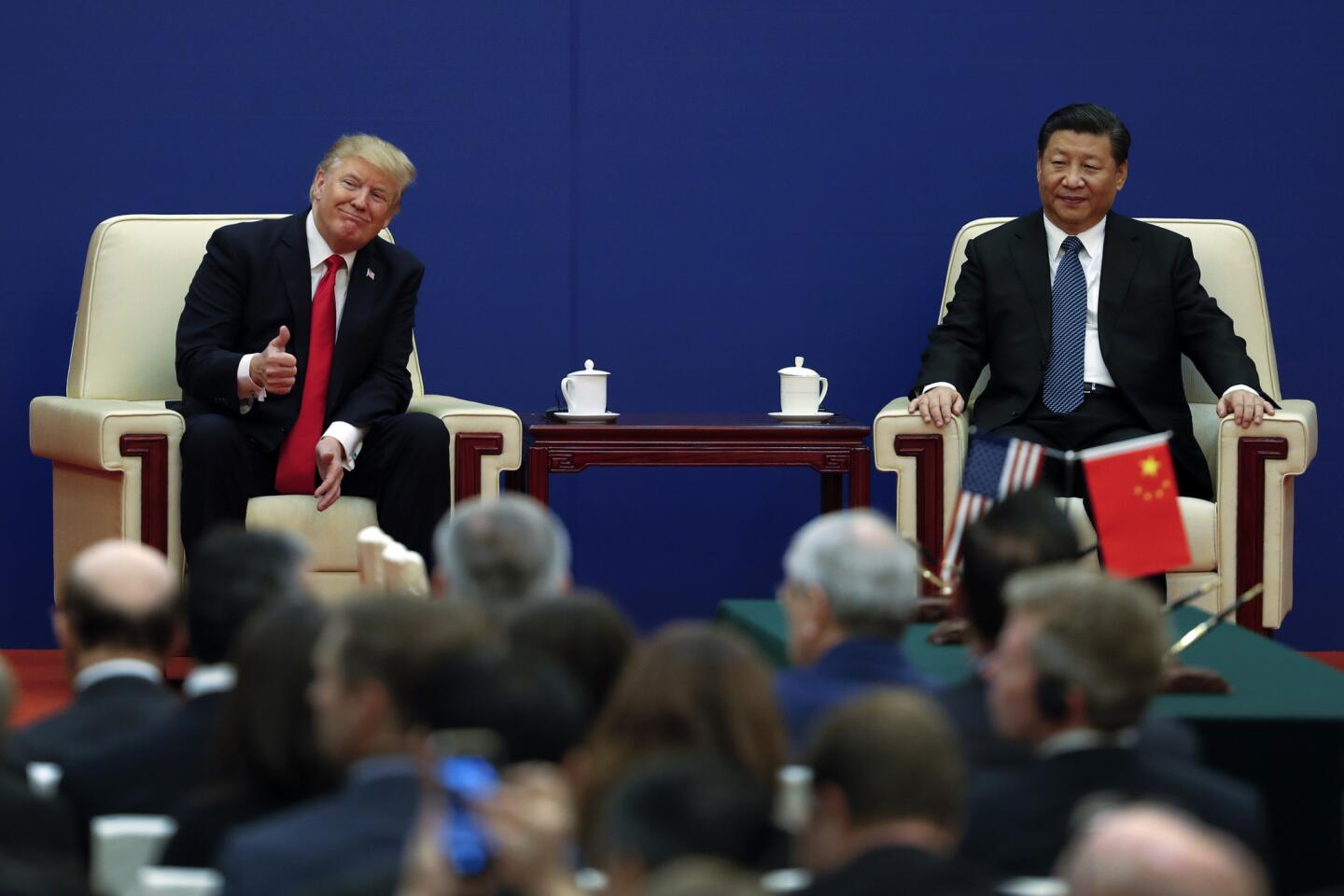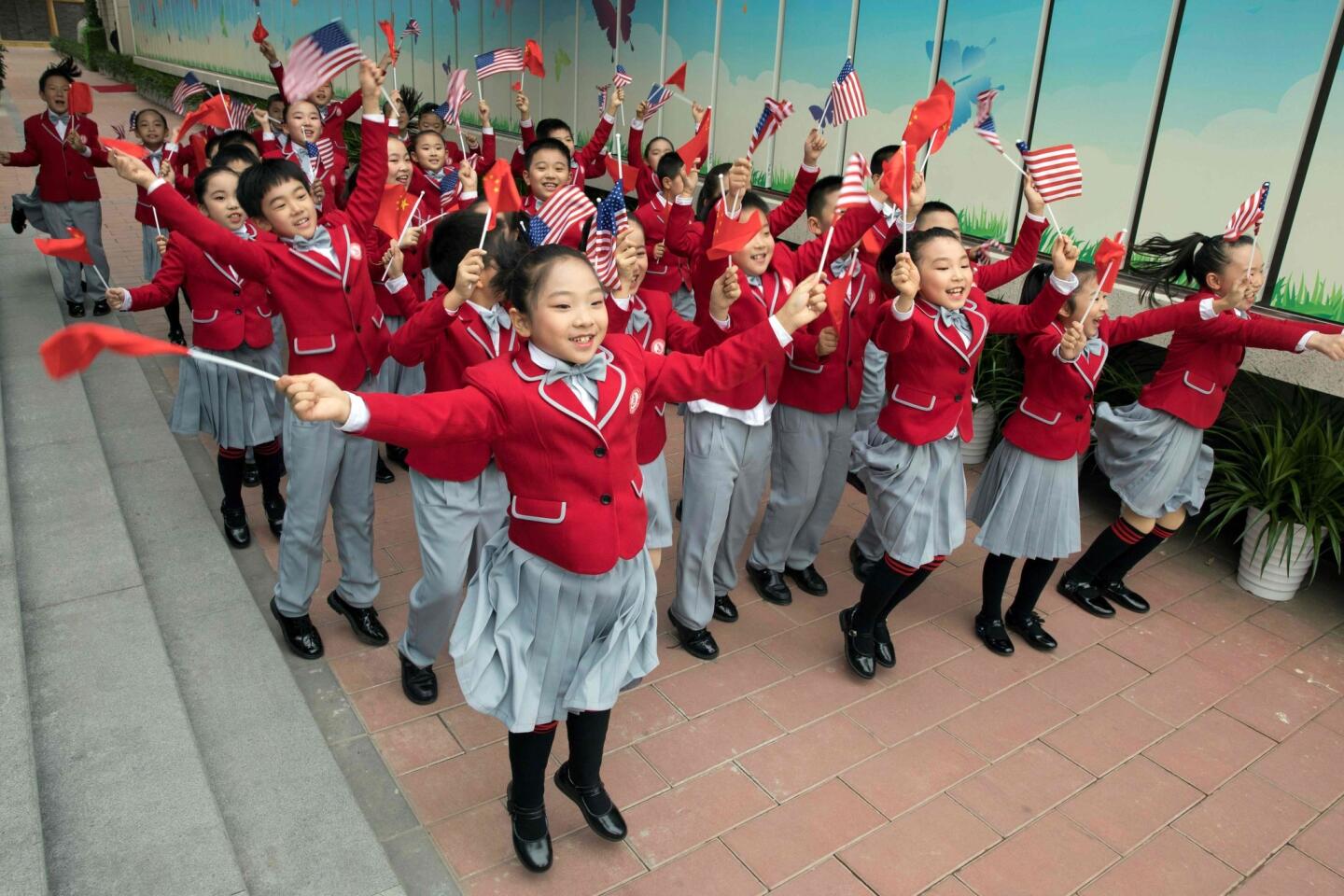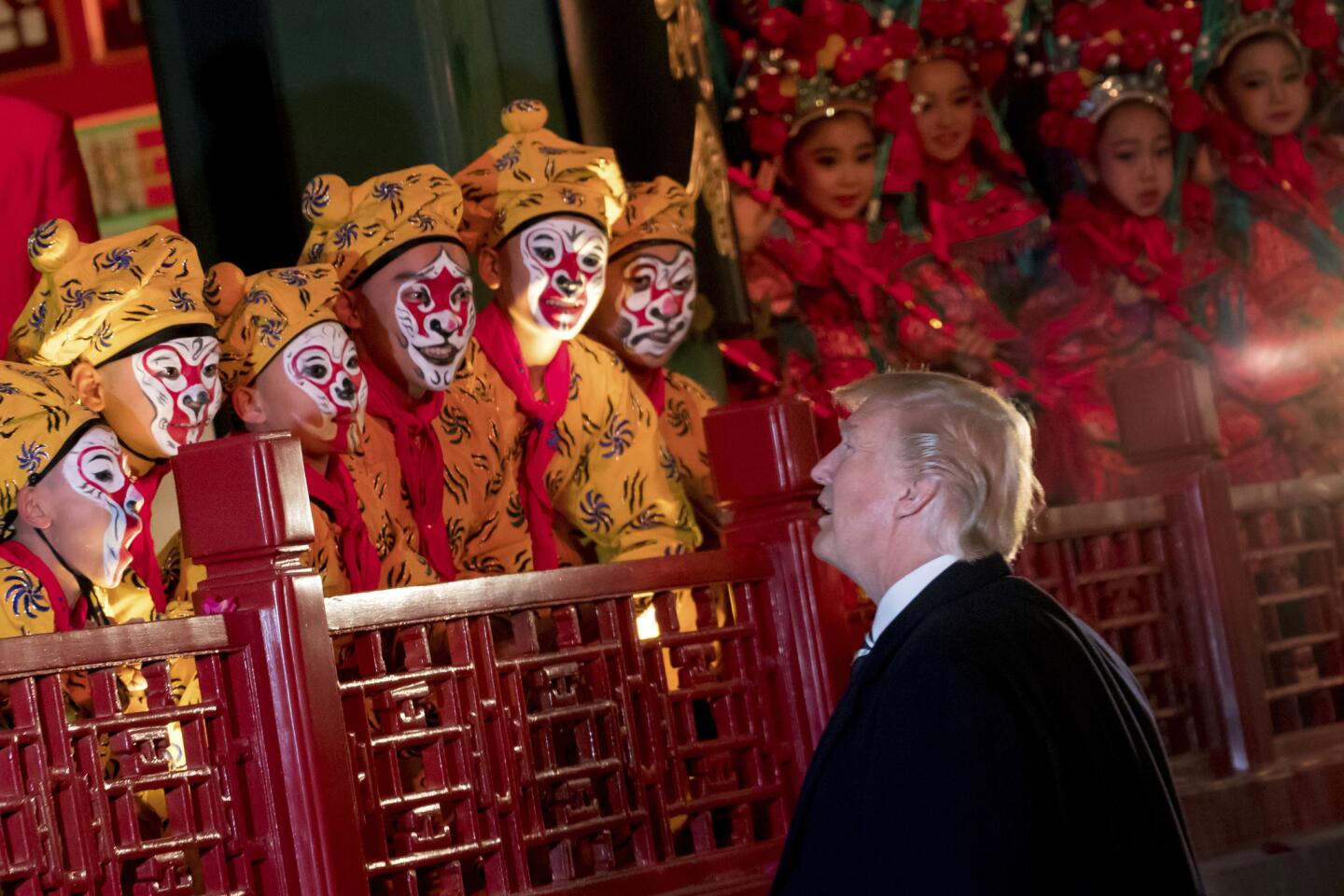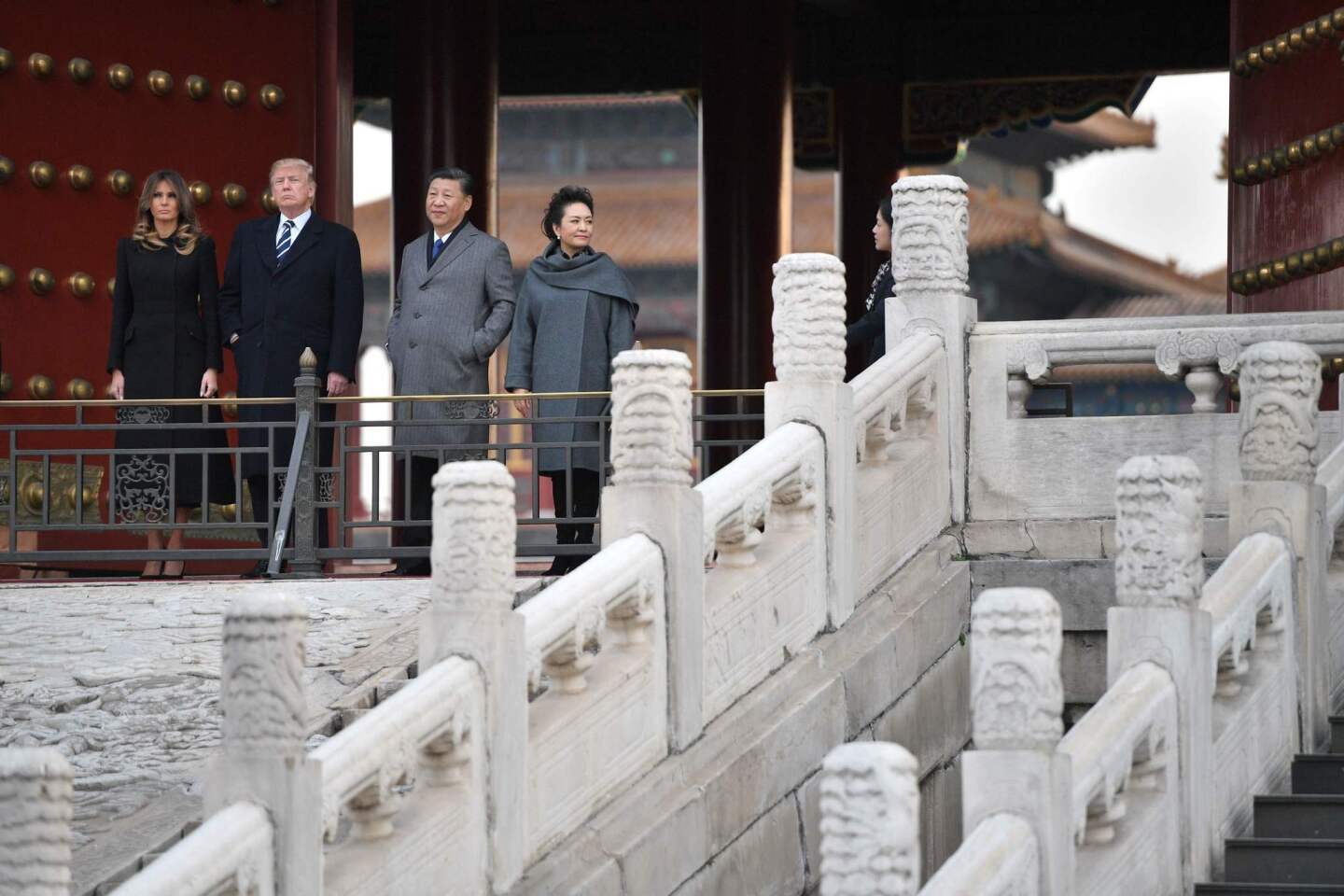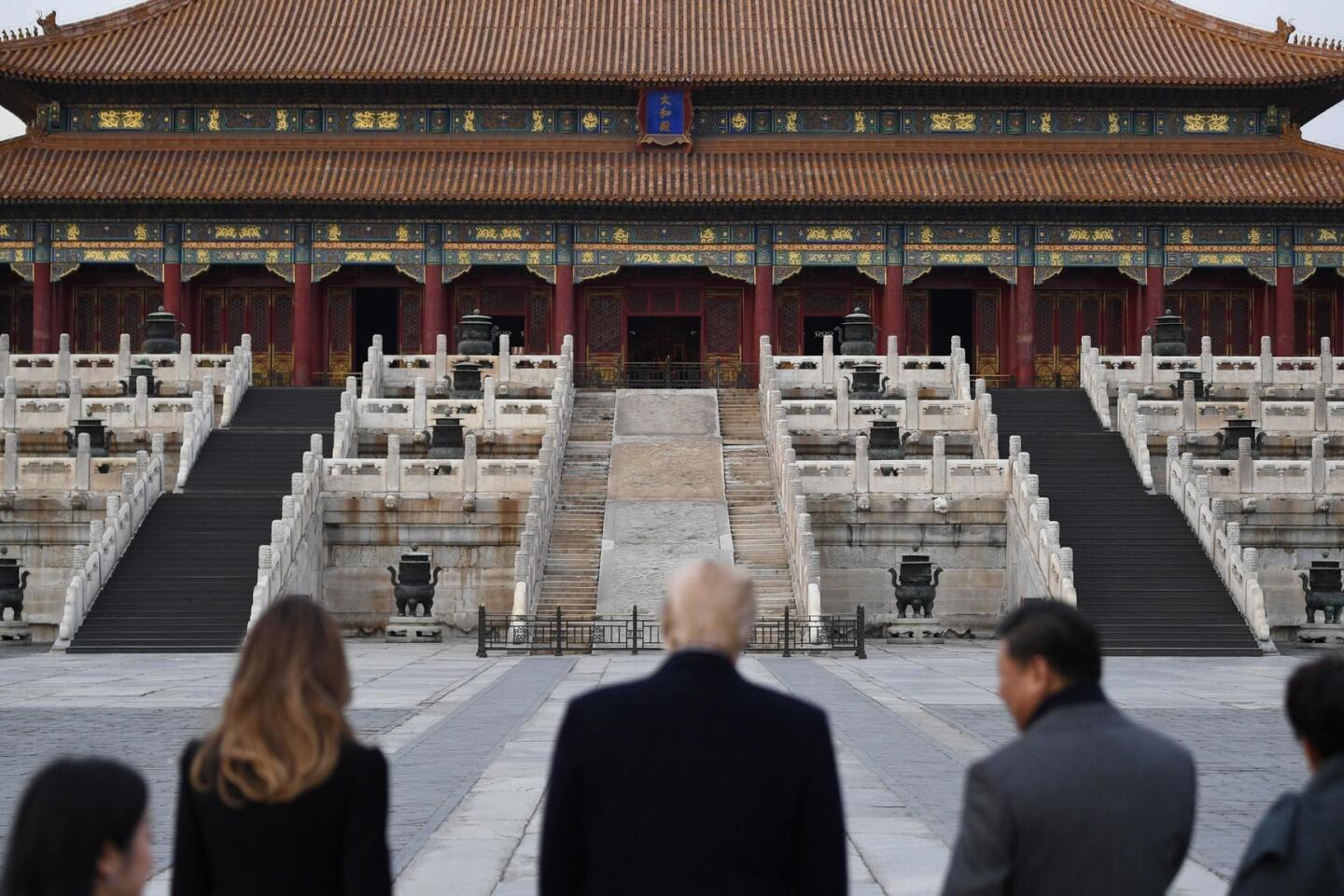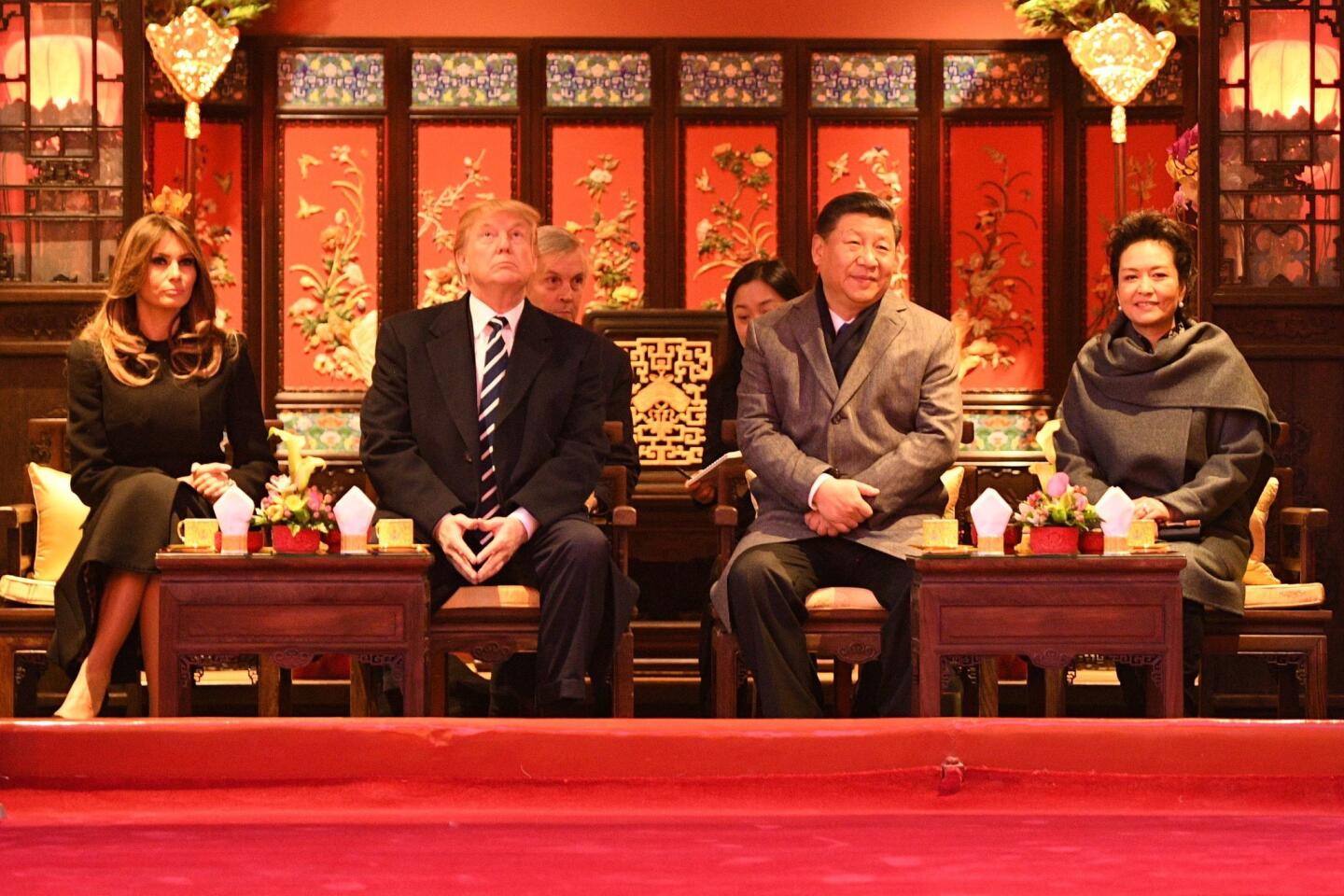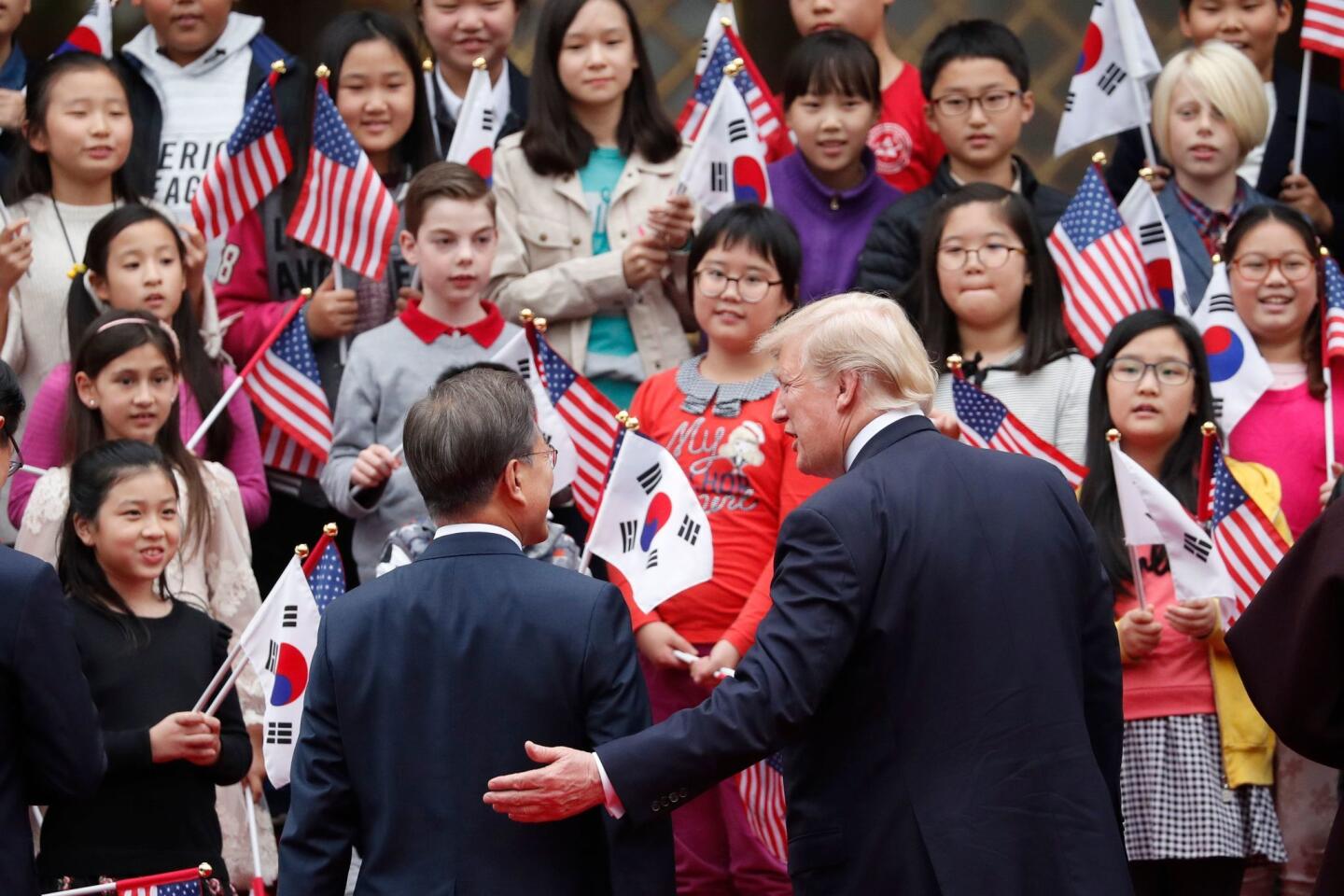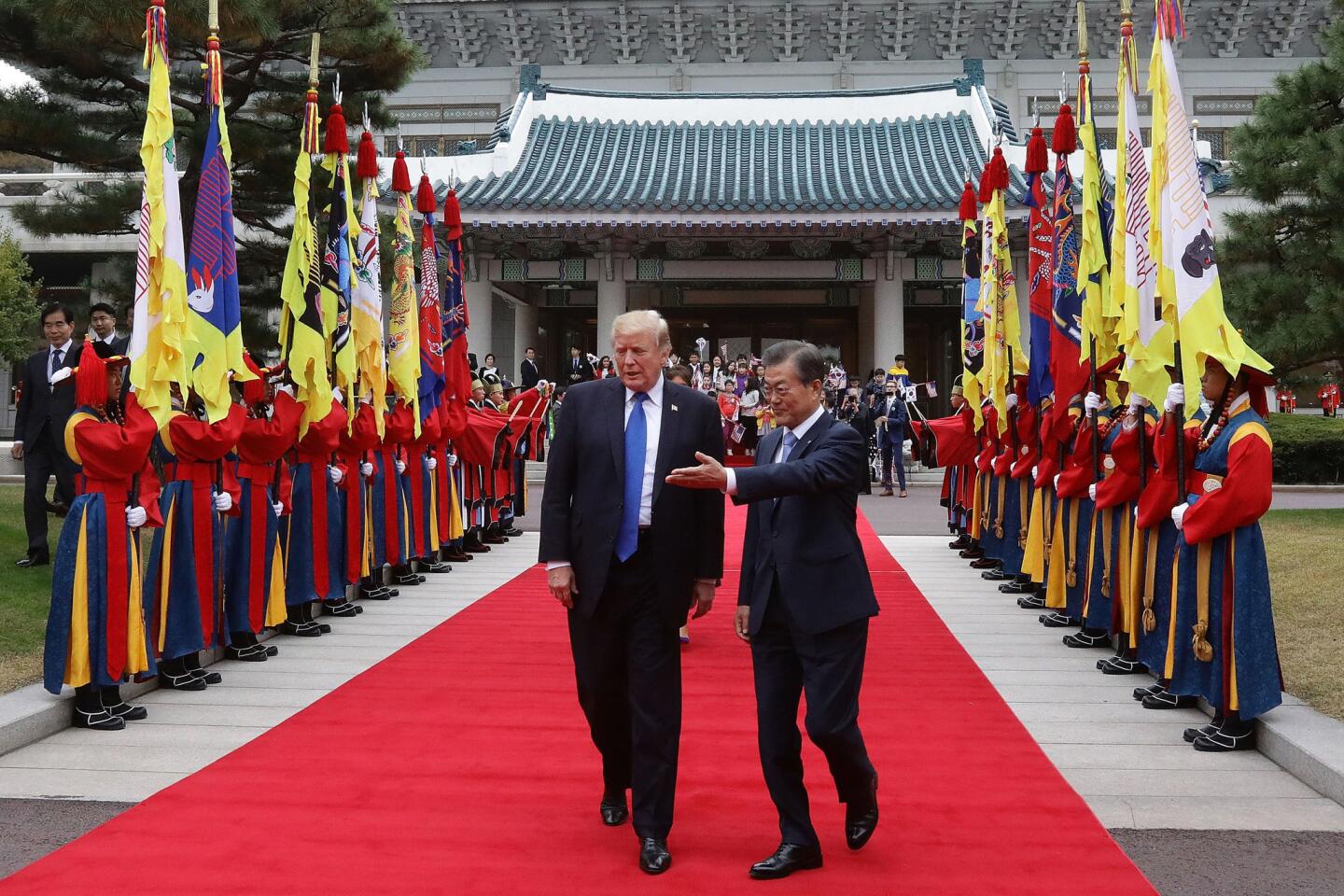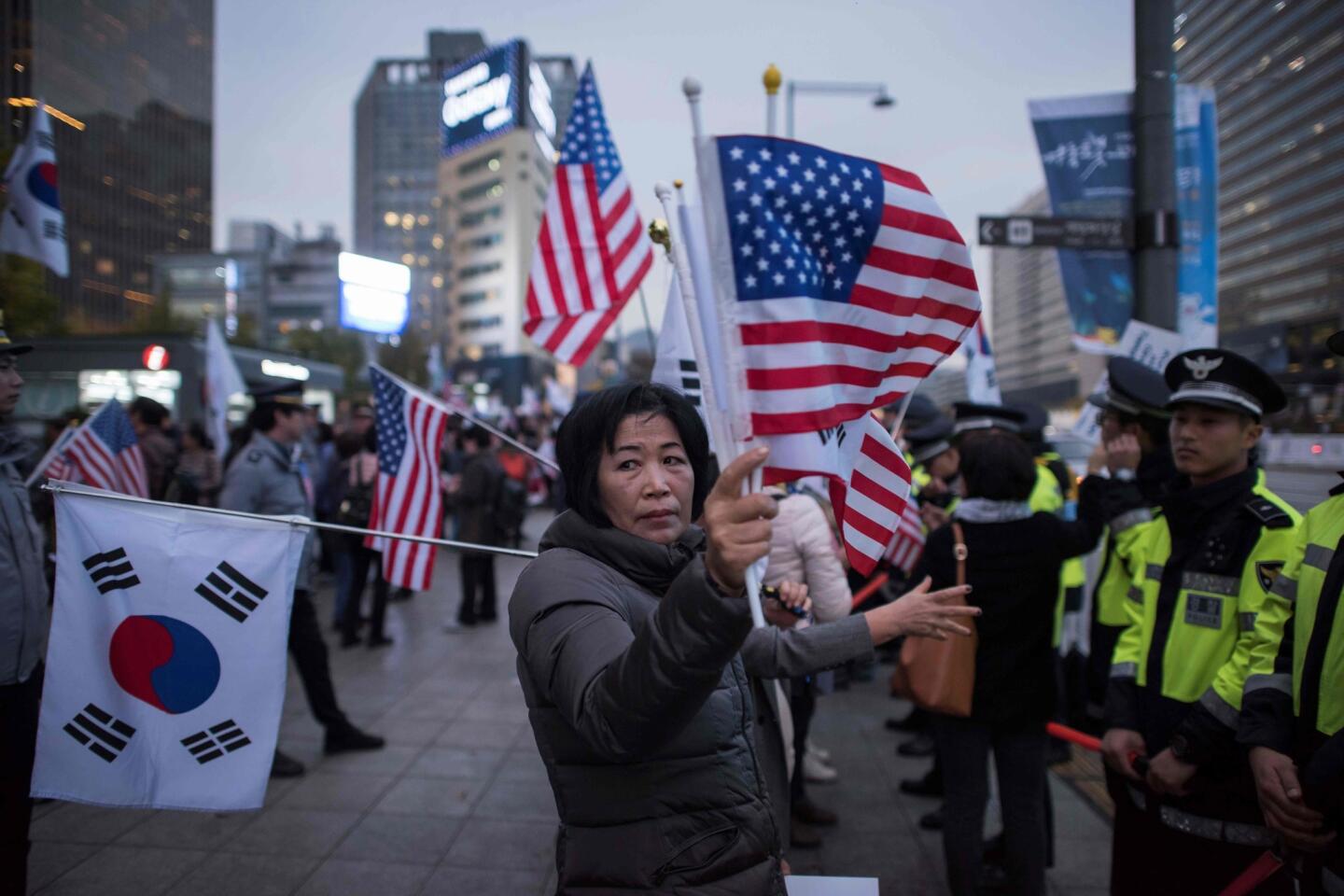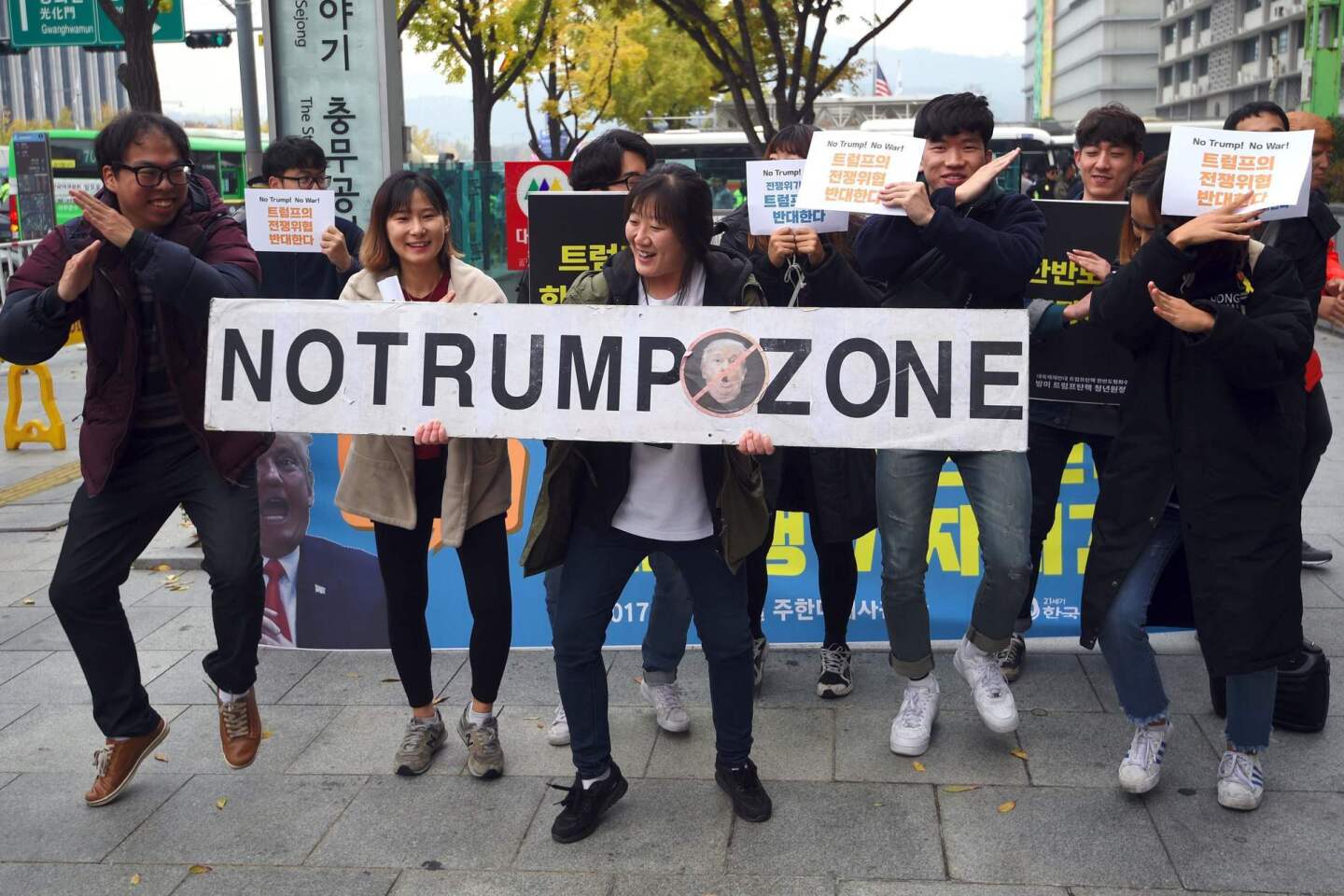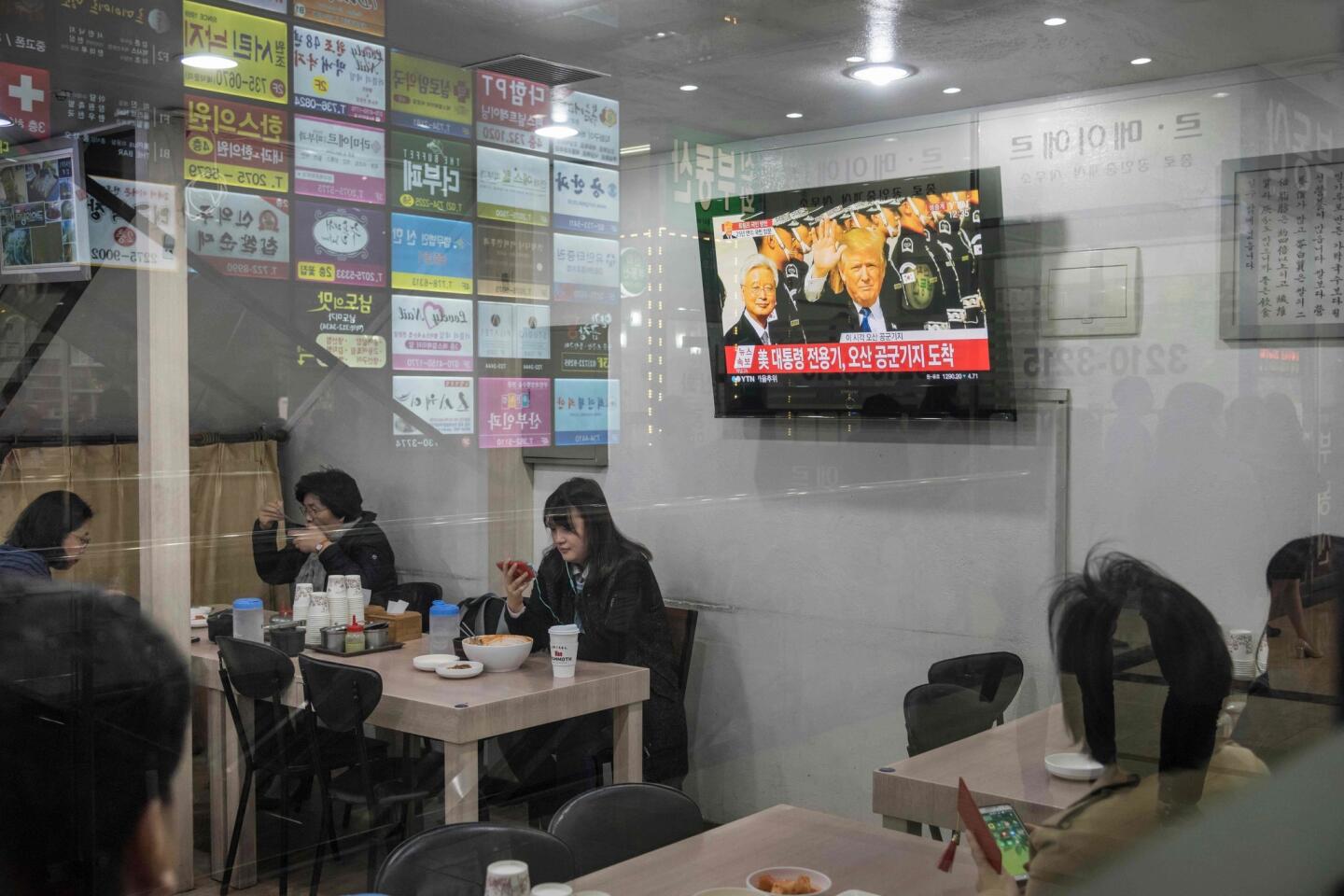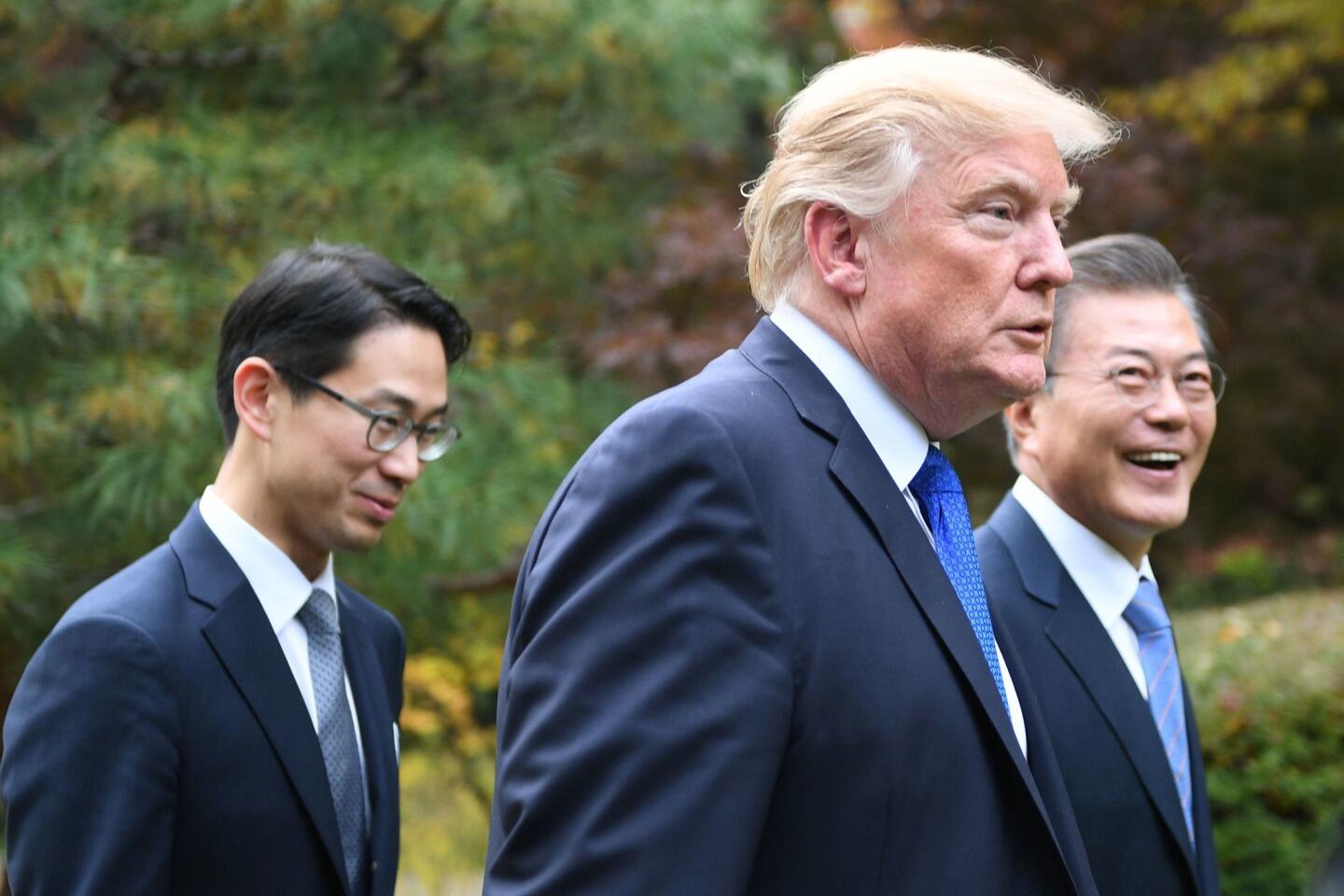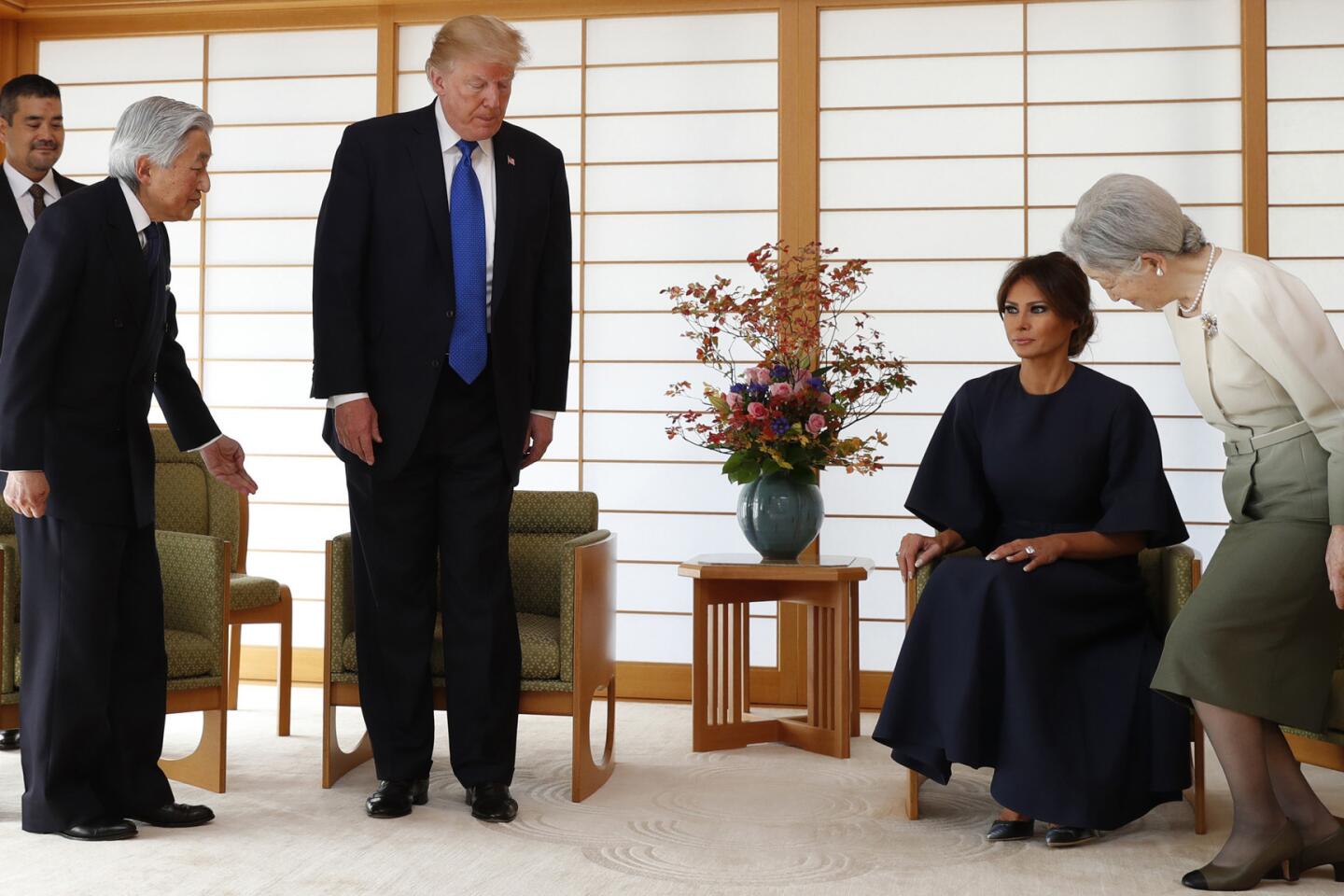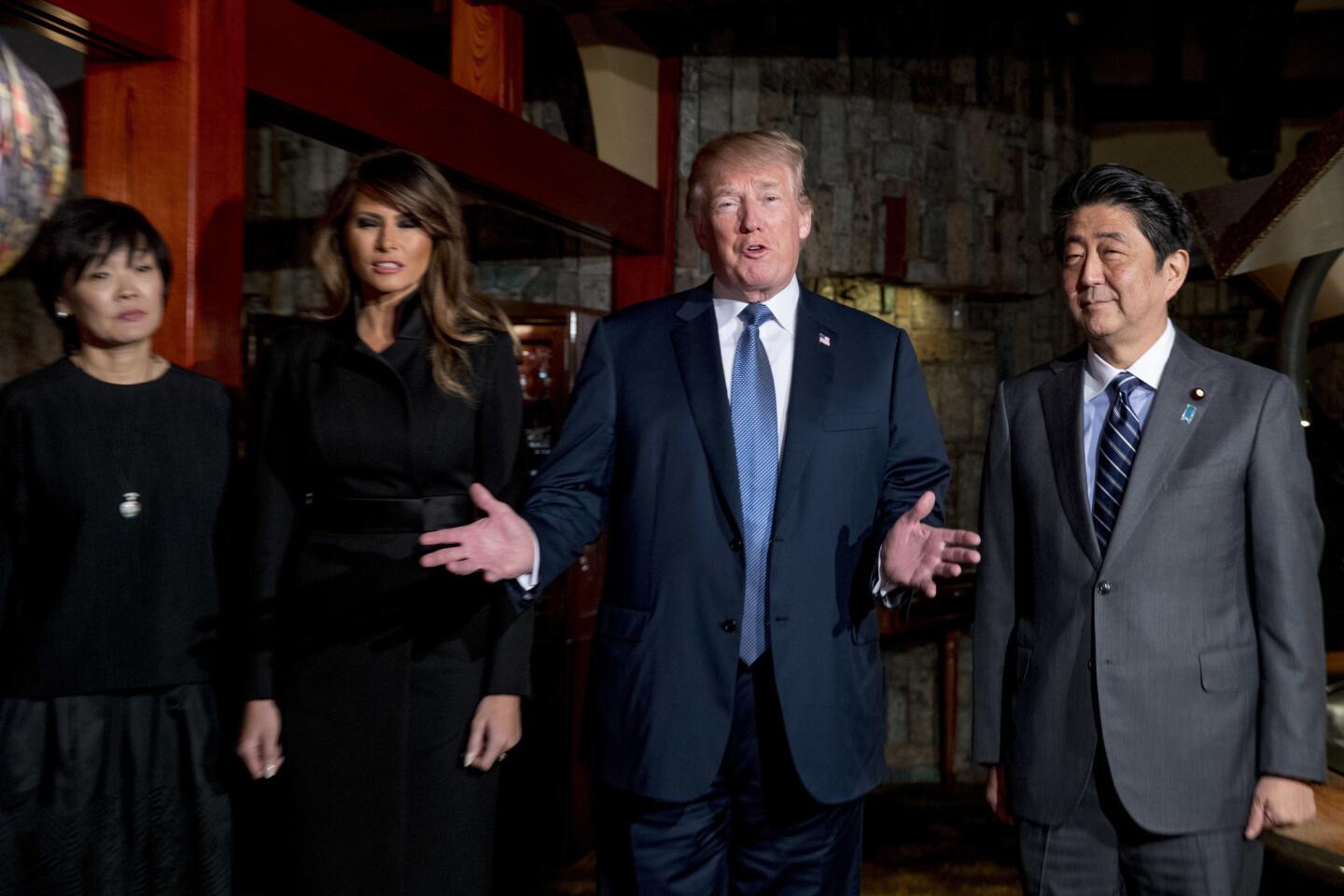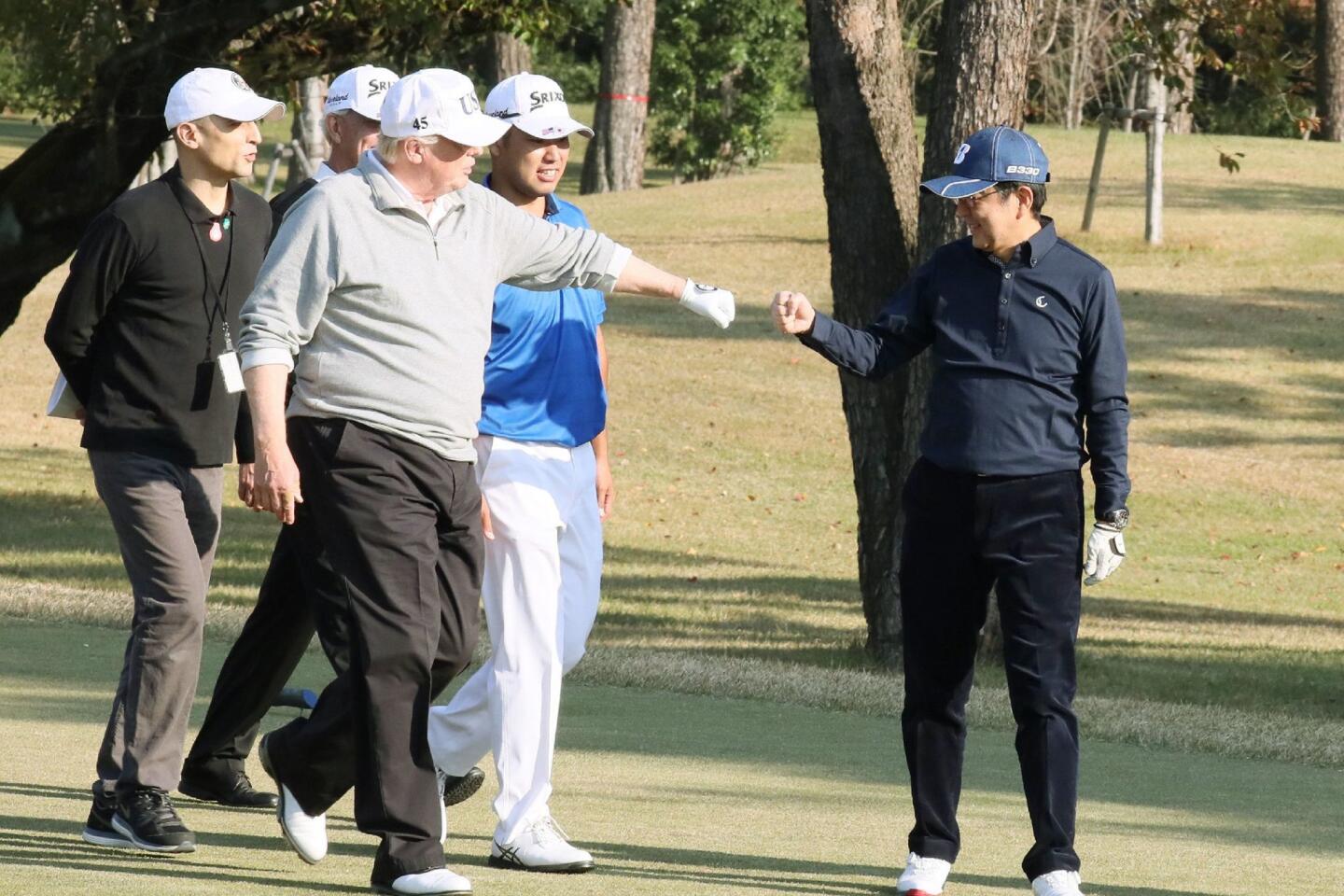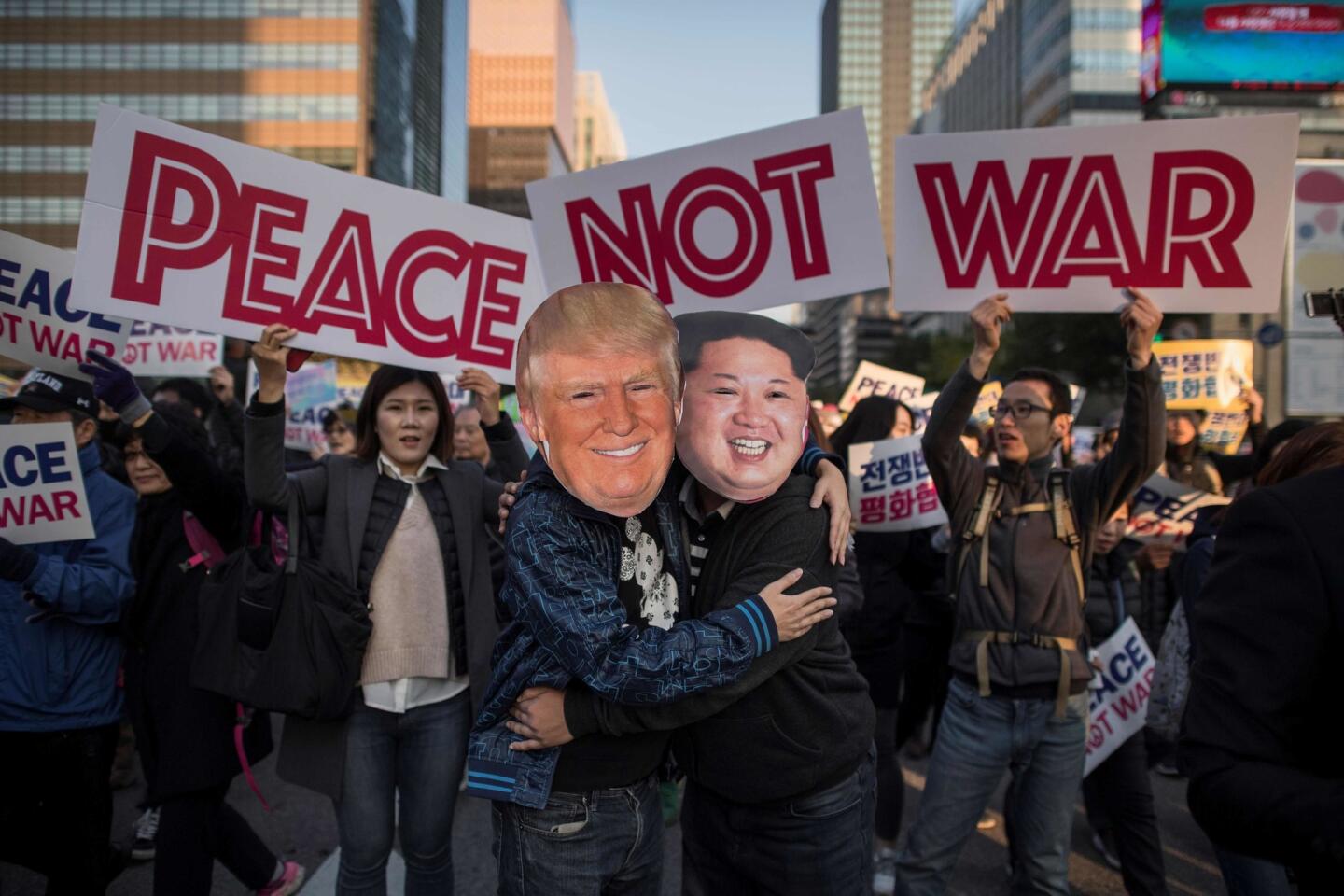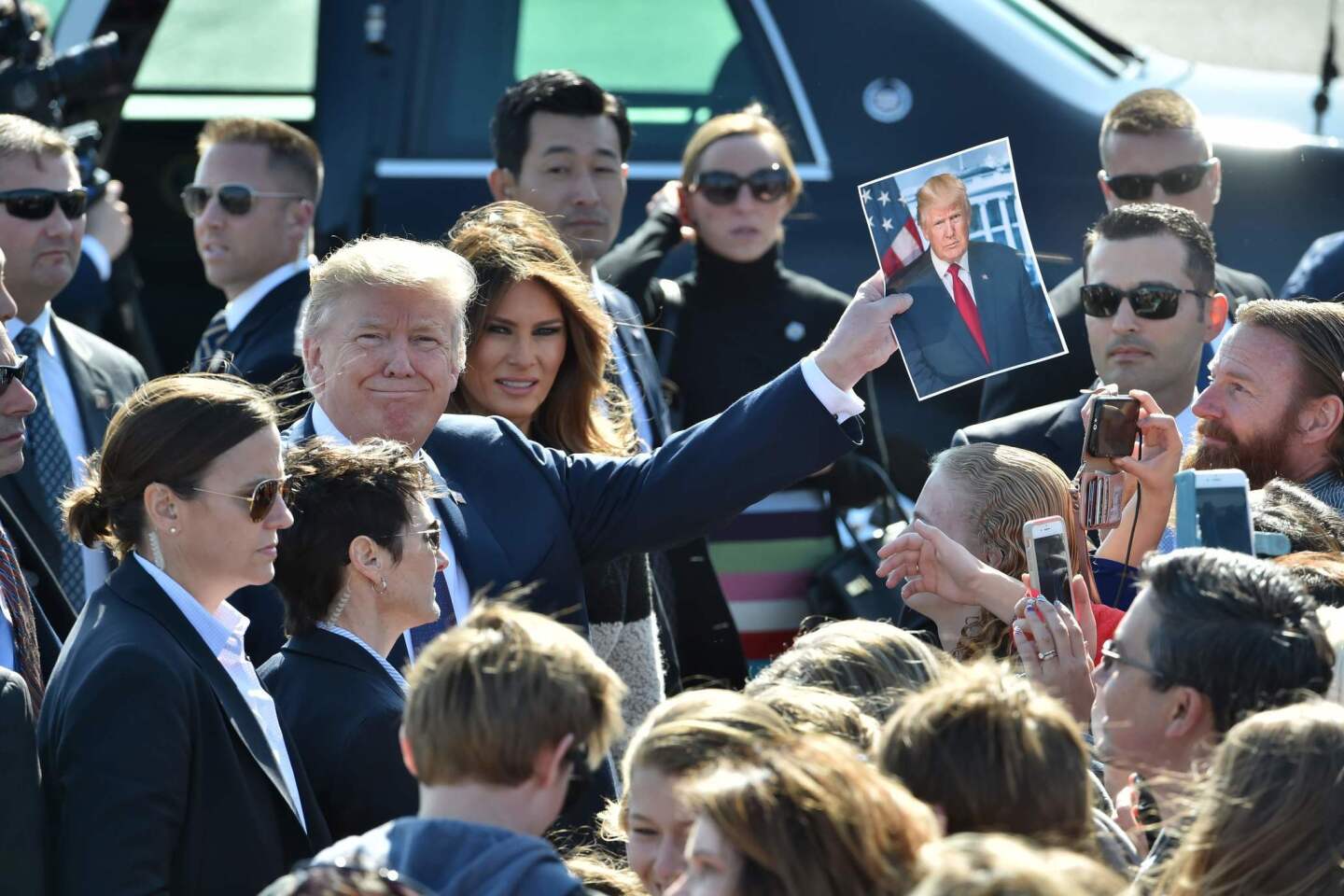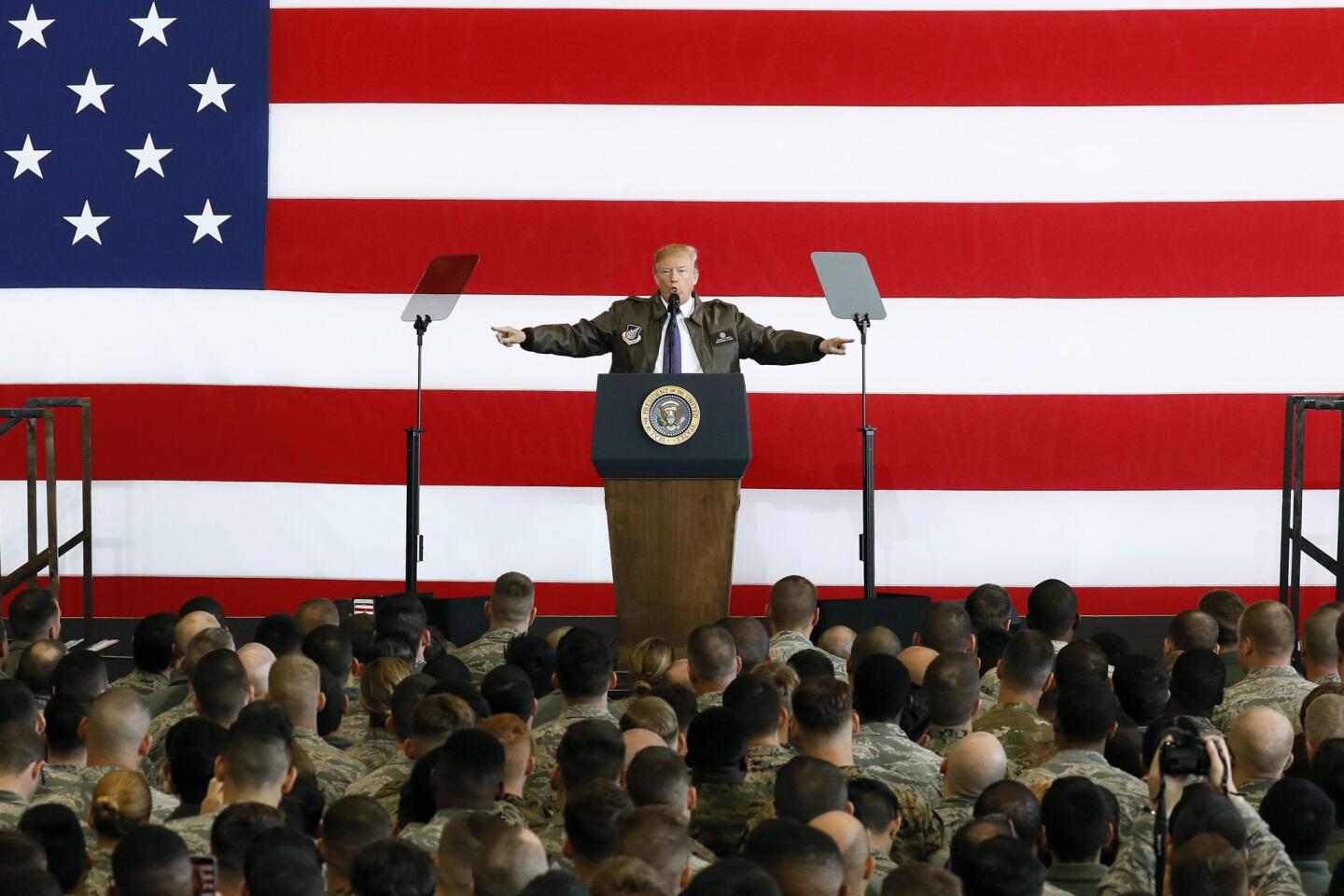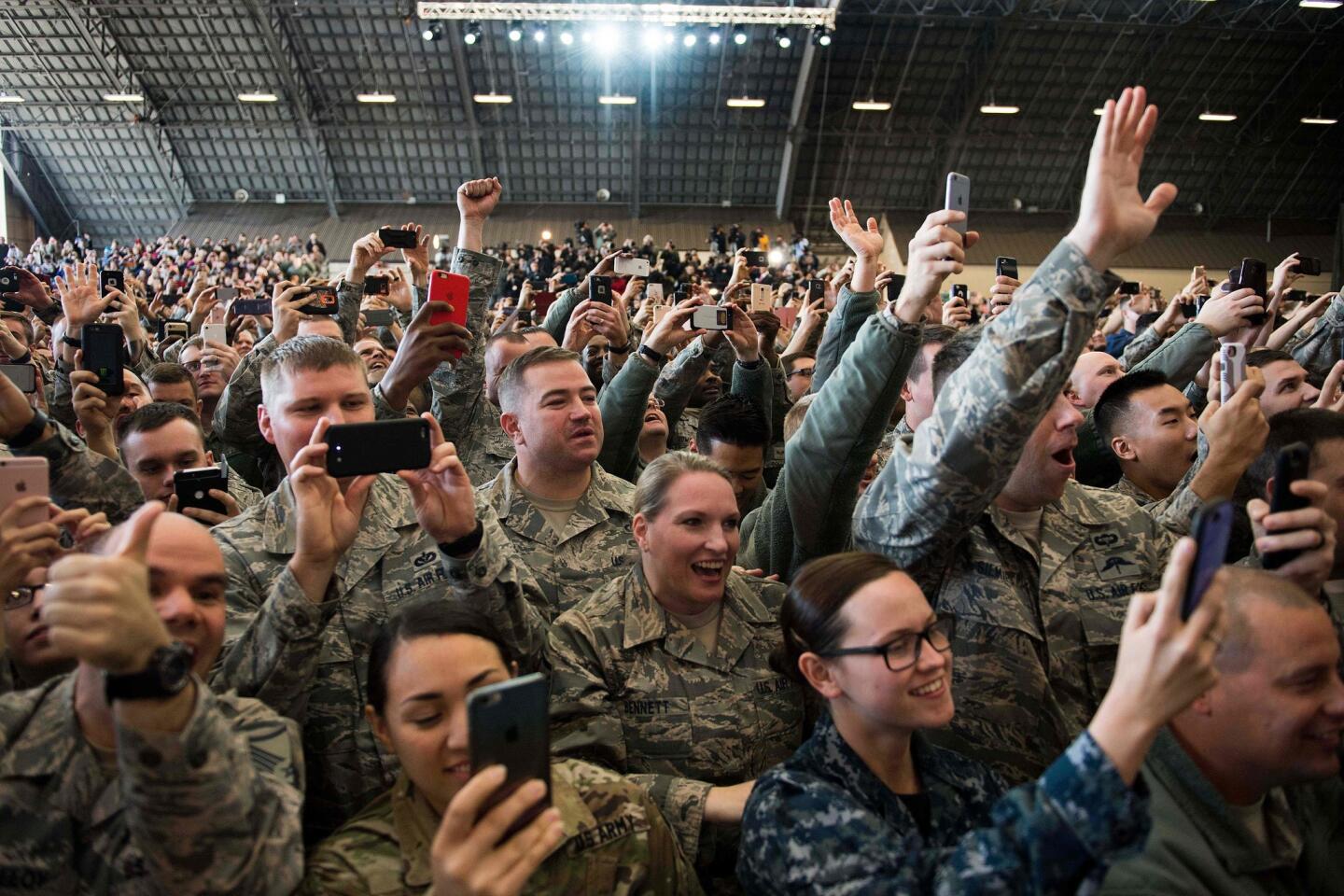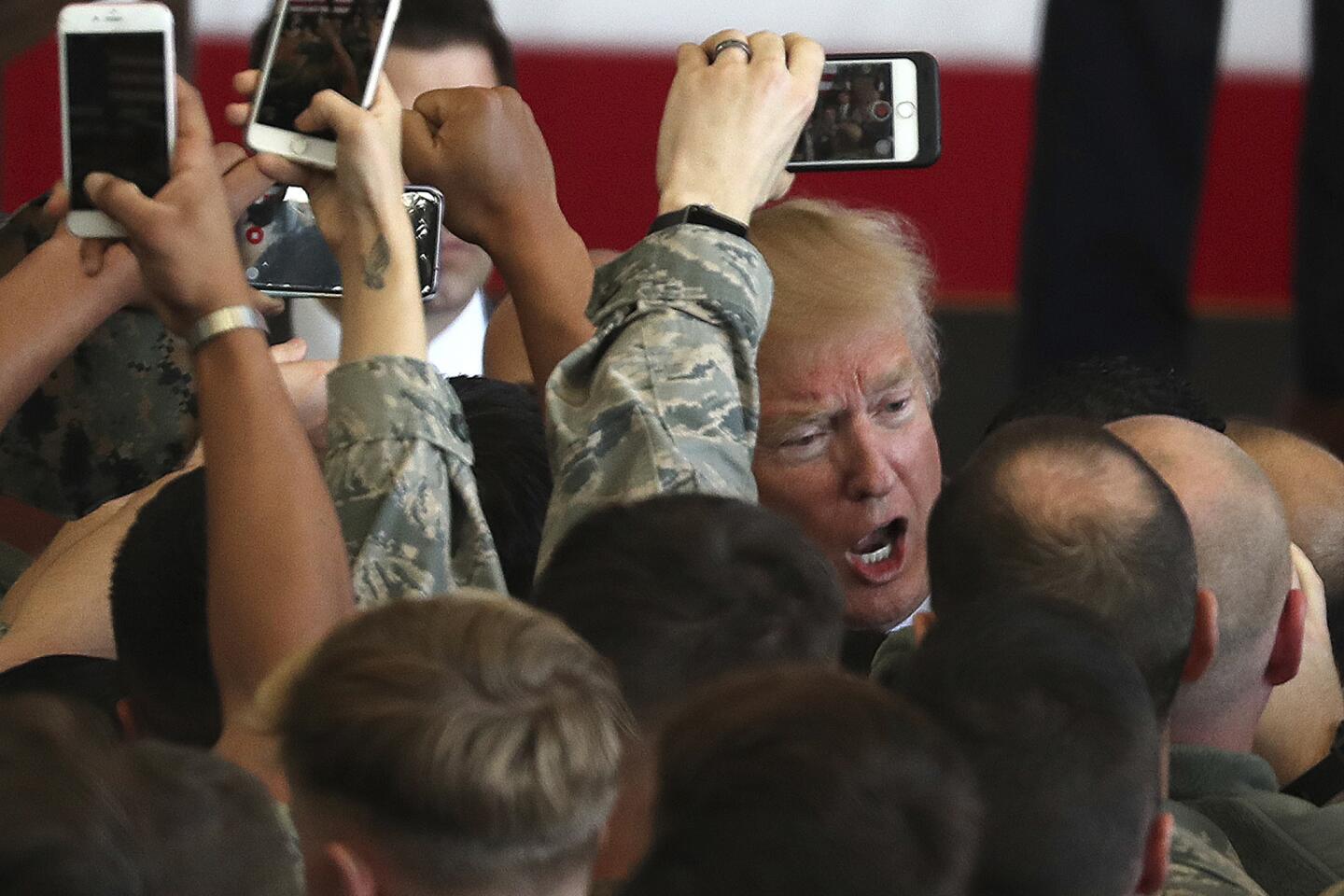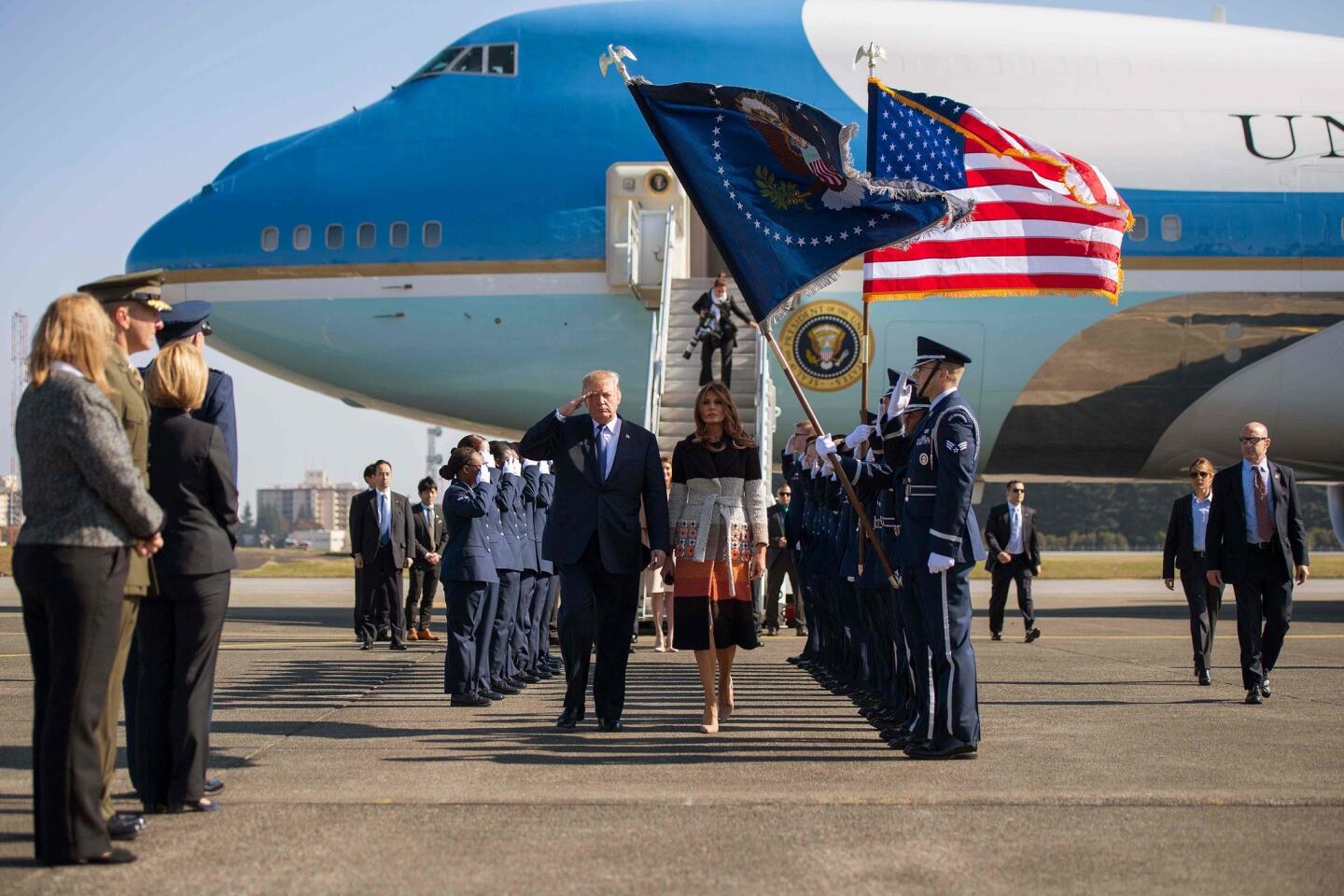Trump opens Asia trip mixing business and golf with Japan’s prime minister
- Share via
Reporting from Tokyo — President Trump spent the first day of a five-nation Asia tour Sunday being feted with a gift, golf and fine dining by Japan’s prime minister, Shinzo Abe. He began day two Monday by telling Japanese business leaders that Abe is “a terrific person,” then assailed them for years of unfair trade.
The corporate titans, as well as Abe, are counting on the former — the prime minister’s personal courtship of Trump — to blunt the latter: any protectionist or retaliatory measures by Trump to upset the U.S.-Japan business relationship.
A year after Trump’s unexpected election, many global leaders have taken his measure and quickly learned to play to the norm-breaking American president’s pride and vanity, in hopes of either advancing bilateral initiatives or staving off Trump’s nationalist threats against their trade arrangements. They know Trump likes to be liked and that flattery can get you, well, something.
Few have practiced the personal diplomacy as intently as Abe.
When the newly arrived Trump showed up Sunday at the Kasumigaseki Country Club outside Tokyo to play golf, Abe surprised him with the sort of trucker caps Trump favors, embroidered in his preferred color — gold — and with a message borrowed from Trump’s signature slogan: “Donald & Shinzo Make Alliance Even Greater.”
In July, French President Emmanuel Macron unexpectedly invited Trump to Paris to join him for France’s massive Bastille Day parade. Saudi King Salman gave Trump a tour of a state-of-the-art counter-terrorism center he built and promised to buy billions of dollars in U.S. military equipment. In China, the third nation on Trump’s Asia itinerary, President Xi Jinping has planned an elaborate welcome for Trump in Beijing, which a top Chinese official described as a “state visit-plus.”
At this first stop in Tokyo, though, Abe set the standard for flattering Trump.
The president, with his new souvenir cap, enjoyed nine holes of golf with not only the prime minister but also the fourth-ranked golfer in the world, Hideki Matsuyama. The outing was Abe’s act of reciprocity — a favorite word of Trump’s, he often says — for Trump’s welcome of the prime minister to Mar-a-Lago, where they also played golf, in February.
Afterward, on Trump’s go-to medium, Twitter, Abe complimented Trump as a “marvelous friend” and said their time on the links was “full of spirited conversation.” Trump, in turn, tweeted that Abe and Matsuyama are “wonderful people.” Later, the two leaders and their wives dined together at an elite teppanyaki grill, where Trump told reporters, “Our relationship is really extraordinary.”
He added a typical hyperbolic flourish: “I don’t think we’ve ever been closer to Japan than we are right now.”
Trump said he and Abe were having “very major discussions on many subjects” including North Korea and trade. “I think we’ll insult everybody by continuing to talk about trade,” he added.
It’s unclear exactly what exactly the Trump administration wants from Japan in the trade relationship. The United States and Japan do not have a bilateral trade agreement, and Trump abandoned the multilateral Trans-Pacific Partnership that President Obama brokered, which would have given American industries, including beef producers, new market access to Japan.
Trump’s message to the executives of 18 Japanese companies and 9 multinational U.S. corporations sounded a vague warning on trade: “I have to say for the last many decades Japan has been winning. You know that.”
Japanese companies currently employ more than 850,000 American workers, and Japan has $400 billion invested in the U.S., a figure that has grown by 9 percent a year in recent years, a White House official said.
Some of those Japanese companies are automakers that have had major U.S. operations for years, yet Trump told the group: “Try building your cars in the United States instead of shipping them over. That’s not rude.”
As he typically does in foreign nations, Trump also hawked U.S. military hardware, but this time with a nod to his friend Abe: “The prime minister is ordering a lot of military equipment, as he should be, given what’s happening with one of your neighbors” — an allusion to North Korea, whose provocative tests to build nuclear-armed missiles have rattled Japan and South Korea, Trump’s next stop.
On North Korea, Trump and Abe are to discuss ways to improve Japan’s ballistic missile defenses as well as how to protect Japan and the United States from cyberattacks launched by Pyongyang, a U.S. official said.
The official told reporters in Tokyo, “The closeness of the relationship is unprecedented, and the degree to which U.S. and Japanese strategies are aligned, both on the Korean peninsula but also throughout the Indo-Pacific, is also unprecedented.”
Japanese media have been intrigued that Trump and Abe use each other’s first name, bucking professional norms in Japan. The Asahi Shimbun publication ran a photo of Trump fist-bumping Abe after a good shot on the golf course, with a caption noting the president also shouted, “Shinzo.”
On public broadcaster NHK, panelists noted that despite the low opinion of Trump among most Japanese, Abe deserved good marks for cultivating a good relationship.
Trump often attacked Japan during his campaign, playing down the threat from North Korea and insisting that Japan wasn’t doing enough to defend itself, instead relying on American force. The comments deeply offended many Japanese.
After his meeting with the corporate leaders, Trump and First Lady Melania Trump had a private audience with Japan’s ceremonial emperor, Akihito, and Empress Michiko.
Special correspondent Gavin Blair in Tokyo contributed to this report.
Twitter: @ByBrianBennett
More to Read
Get the L.A. Times Politics newsletter
Deeply reported insights into legislation, politics and policy from Sacramento, Washington and beyond. In your inbox twice per week.
You may occasionally receive promotional content from the Los Angeles Times.

